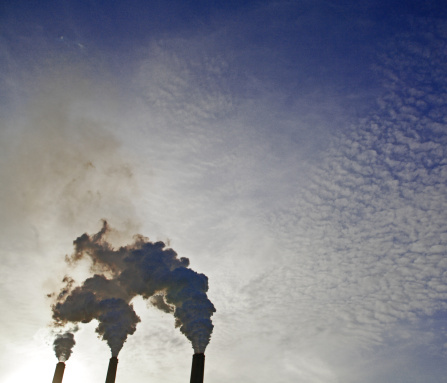Social Cost of Carbon Greatly Underestimated: Report
Carbon dioxide emissions are causing the climate to change and those changes come with a real cost. The big questions are what’s the price tag for that “social” cost and when does it gets paid? According the a new report, current best estimates could actually be on the low end thanks to “unknown unknowns.”

Andre Kudyusov / Photographer's Choice RF
The most recent estimate for the cost of a ton of carbon emissions -- referred to as the social cost of carbon -- is $37. That number was calculated in 2013 by 12 federal agencies using three models that incorporate both our physical understanding of climate change and the cost of climate impacts around the globe.
The new report published on Thursday argues that these estimates are far too low because they ignore or poorly quantify 29 key climate impacts. The Cost of Carbon Project, a partnership between the Institute for Policy Integrity, Environmental Defense Fund, and Natural Resources Defense Council, published the report.
Currently, there are key components of the climate system that are not included in calculating the social cost of carbon. They include ocean acidification, rapid sea level rise, wildfires and changes in heat and precipitation extremes. Changes to those will impact innumerable things including energy, water, transportation, public health, and labor productivity, to name just a few.
But those calculations are poorly understood or nonexistent in the economic models, which implicitly sets their cost to zero. Gernot Wagner, a senior economist at EDF who didn’t contribute to the report, said that is artificially deflating the social cost of carbon because it’s highly unlikely there are no costs associated with them.
Past advances in determining how the climate is likely to change have had dramatic impacts on understanding and establishing the social cost of carbon.
“Three years ago it was $21.40. Now it is $37. That near doubling of the number was, to a large extent, due to a fact that the three economic models are now including the full effect of sea level rise,” Wagner said.
But even the sea level rise estimates used in economic models are dated due to the time it takes to update the models and the constantly evolving state of climate research.
The social cost of carbon is regularly used to determine the benefits of policies that reduce carbon emissions. In turn, understanding those benefits help the federal government set rules such as capping power plant emissions, raising fuel efficiency and basically, any activity that involves carbon emissions.
It also isn’t a fixed number. In the future, society is likely to become wealthier. Continuing to emit carbon is also likely to increase the odds of more adverse climate impacts. That means based on the most recent estimates, the same ton of carbon that cost $37 in 2014 will cost $43 in 2020.
The report identifies “hot spot” areas of research that can help improve estimates, like trying to account for or project changes in extreme weather events and the intersection of climate change and social issues such as famine, conflict and migration.
Quantifying extreme events is inherently difficult because they are rare and chaotic. In some years, a mega event like Hurricane Katrina can account for a huge chunk of losses while in a year like 2013, there can be a record number of billion-dollar weather disasters without one “mega” event.
Wagner said in economics, such events are defined as “unknown unknowns” or “tail events,” which refer to the far end on a bell curve where low probability-high impact events sit. Their uncommon nature also makes linking extreme weather events and climate change exceedingly challenging, though this type of attribution is an area of growing research.
The multifaceted connection between social unrest and climate elements are also highly variable and difficult to model. Some advances have been made in connecting climate change with increases in conflict, but the research is still considered somewhat speculative.
While reducing those uncertainties are key, Wagner said one thing is fairly certain about how those estimates will change.
“At the very least let’s use 37 bucks now going forward,” Wagner said. “If we are able to quantify other impacts, the price is only going to go up.”
Copyright © 2014 Climate Central.
http://www.climatecentral.org/news/social-cost-of-carbon-is-greatly-underestimated-report-17170
